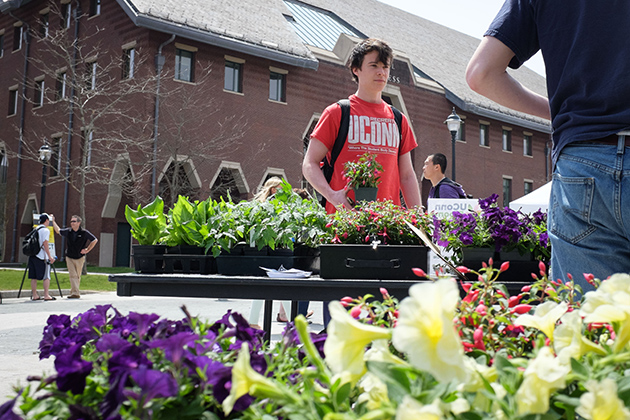During the final weeks of the spring semester, the UConn community is coming together in an effort to change the way we think about the environment. A multitude of events is planned as part of the Environment Metanoia with the goal of encouraging transformative change – the very definition of the word metanoia.
“We desire to reach every member of the UConn community through this metanoia on the environment because it is our environment,” says John Clausen of the Department of Natural Resources and the Environment, and faculty co-chair of the Environment Metanoia Steering Committee.
More than 30 proposed events, talks, and other activities will explore subjects impacting the globe, including sustainability, water and food availability, deforestation, loss of biodiversity, and environmental justice. Though some events have already taken place, the majority will happen the week of April 15 to 20, leading up to Earth Day on April 22.
The keynote address, “Extreme Energy Extraction in Alaska: A Climate of Chaos,” will be given by Native American activist Faith Gemmill-Fredson, who represents her Neets’aii Gwich’in, Pit River, and Wintu tribes, indigenous peoples affected by climate change. Among her many roles in environmental activism, Gemmill-Fredson is the founder and current executive director of the group REDOIL, Resisting Environmental Destruction on Indigenous Lands. Gemmill-Fredson has also been active in the Standing Rock protests of the Dakota Access Pipeline. Visit the schedule of events for details on the date and time for the keynote address.
Environmental Stewardship
The Environment Metanoia is a chance both to increase awareness about current issues around the world and to learn more about UConn’s numerous ongoing efforts to diminish the University’s environmental impact.
“The University Senate recently voted to make environmental literacy a general education requirement for all graduates. As one of the first institutions in the world to do so, this is making us a leader for change,” says David Wagner, professor of ecology and evolutionary biology. “Given our national status as a green institution and our strong environmental record, this is a source of pride for our campus.”
UConn has also achieved gold status from the Association for the Advancement of Sustainability in Higher Education’s Sustainability Tracking, Assessment, and Rating System, for its commitment to the environment. Walking tours to spotlight UConn’s innovative and sustainable infrastructure efforts are planned.
Less immediately visible topics of sustainability and human impact on the environment will also be explored as part of the Environment Metanoia.
UConn researcher Chandi Witharana will talk about his research using remote sensing. He will make his presentation against the backdrop of a gallery of images he curated on the second floor of Homer Babbidge Library. The gallery showcases high-resolution satellite imagery intended to call attention to Earth’s beauty and the many ways humans are affecting the planet.
The Environment Metanoia will overlap with this year’s Spring Fling event on Fairfield Way, organized by UConn’s Sustainability Office, which is taking place on April 16 and 17. To illustrate the fact that nearly half of all food produced in the United States ends up in the trash, the Spring Fling event will feature a “Tasty Waste‘ lunch prepared and served by Dining Services, where food destined to be discarded will be repurposed as a free meal for those who attend.
Visit the growing schedule of events, which is updated regularly. On social media, search, post, and tag with #UConnMetanoia to help spread the knowledge and stay up-to-date on the events.
Broad support for the Enviornment Metanoia was provided by President Herbst, the Office of the Provost, and the University Senate.




